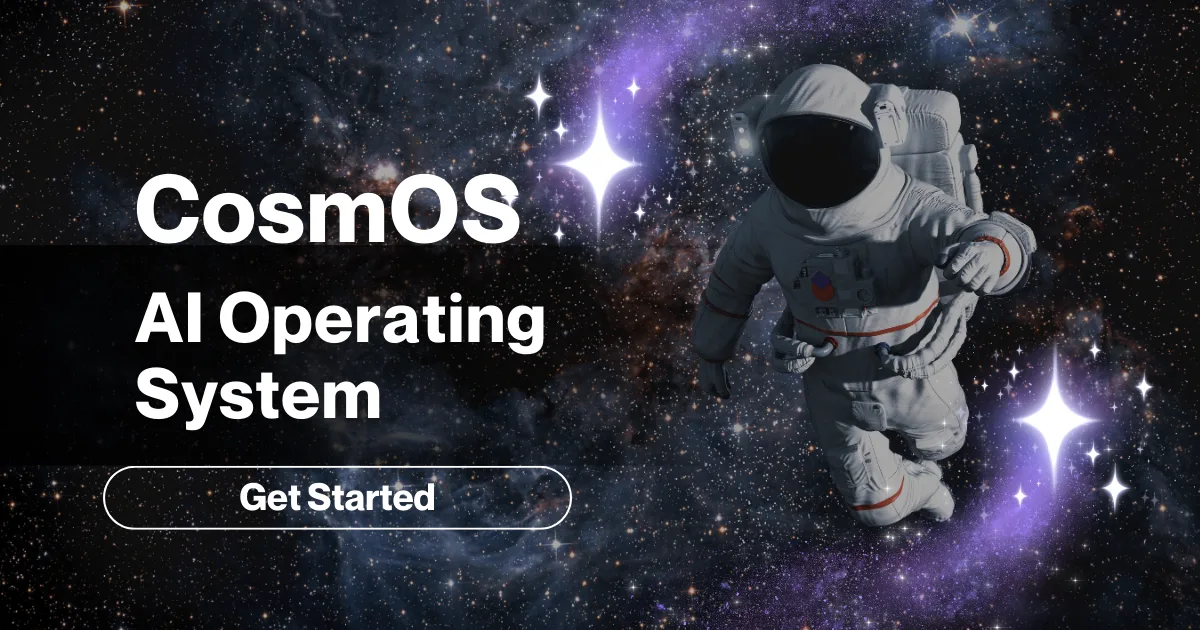In the rapidly evolving landscape of technology, the integration of artificial intelligence (AI) into everyday devices has become paramount. Leading this transformation is CosmOS, an innovative operating system developed by Humane. Designed specifically for the Intelligence Age, CosmOS redefines user interaction by providing personalized assistance, streamlining complex tasks, and seamlessly integrating across a multitude of devices.
CosmOS stands as a testament to Humane‘s vision of an AI-centric future. Unlike traditional operating systems that rely heavily on user input and predefined applications, CosmOS leverages advanced AI capabilities to anticipate user needs and act proactively. This shift from reactive to proactive computing signifies a monumental leap in how users engage with technology.
Table of Contents
Core Architecture of CosmOS
At the heart of CosmOS lies a sophisticated architecture engineered to harness the full potential of AI.
Intelligent Agents
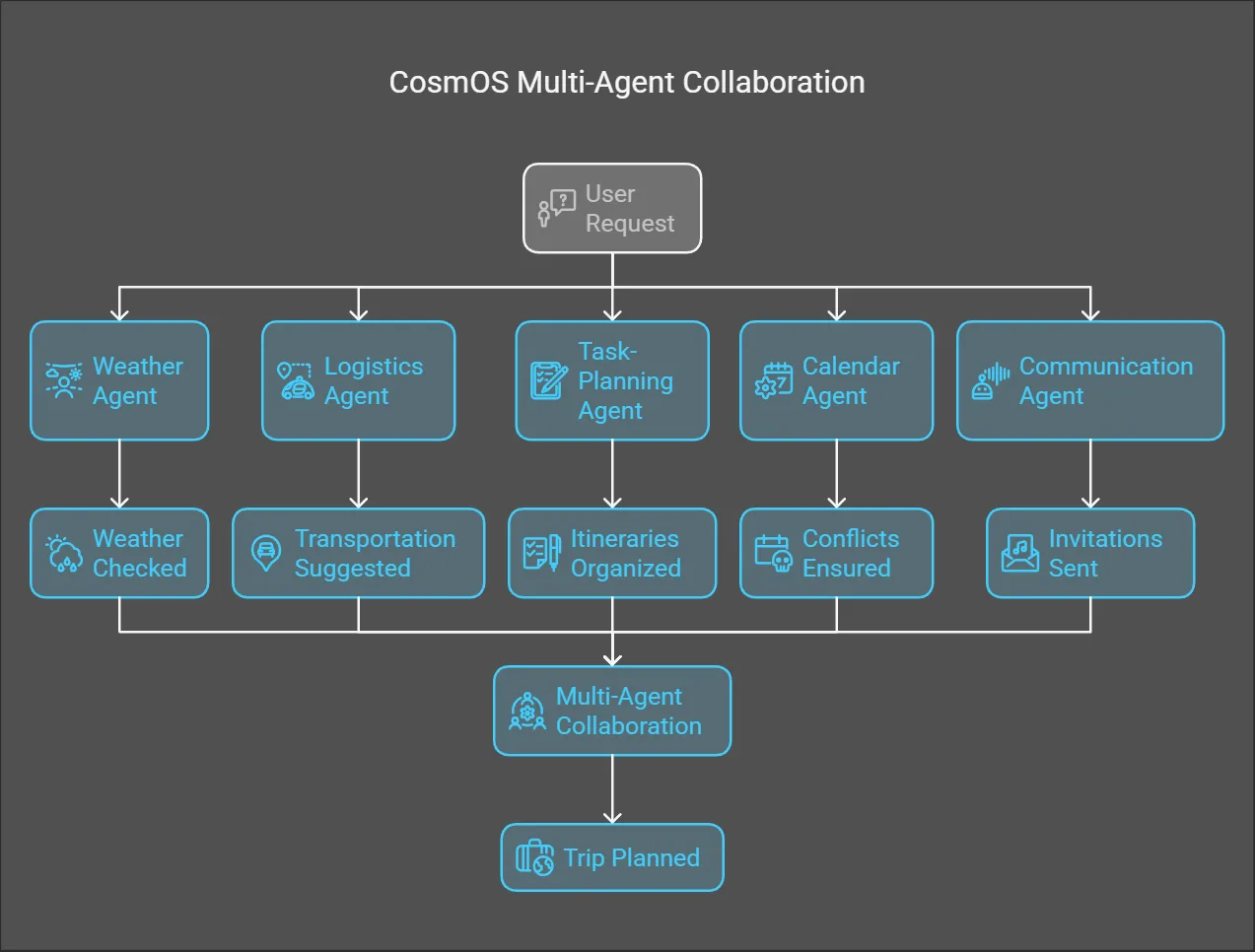
At the heart of CosmOS are its intelligent AI agents, each specialized in handling distinct tasks. Unlike traditional applications that require manual user input, CosmOS operates with autonomous AI-driven assistants that anticipate needs and work together seamlessly.
Each agent is an expert in its domain—weather, news, music, vision processing, communication, and task planning. Rather than relying on separate applications, these agents collaborate in real-time, dynamically processing data and solving complex requests without requiring user intervention.
For example, if a user asks CosmOS to plan a weekend trip, the system activates multiple agents:
- A weather agent checks upcoming forecasts.
- A logistics agent suggests transportation options.
- A task-planning agent organizes itineraries.
- A calendar agent ensures there are no conflicts.
- A communication agent sends invitations to friends or family.
This multi-agent collaboration makes CosmOS an intelligent, adaptive, and self-sufficient AI system rather than a static OS.
The Ai Bus: Orchestration Engine
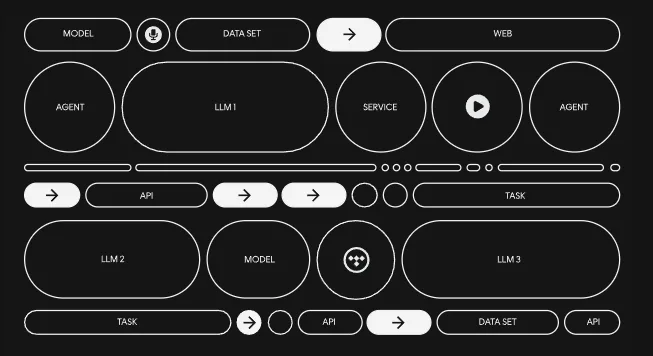
CosmOS introduces the Ai Bus, a powerful AI orchestration engine that manages interactions between various AI models, data sources, and devices. Unlike traditional OS task schedulers, the Ai Bus dynamically assigns tasks to the right agents, optimizing workflow efficiency.
This intelligent system ensures:
- Seamless communication between multiple AI agents.
- Efficient allocation of processing power, reducing latency.
- Instant adaptation to different computing environments, whether on wearables, desktops, or cloud-based systems.
For instance, when a user makes a complex request like “Plan my day”, the Ai Bus determines which agents are required, delegates tasks accordingly, and compiles results into an organized schedule.
Multistep Reasoning and Parallel Processing
CosmOS is built with advanced reasoning capabilities that allow it to break down complex tasks into multiple steps while processing them simultaneously. Unlike conventional systems that execute tasks sequentially, CosmOS leverages parallel execution to increase speed and efficiency.
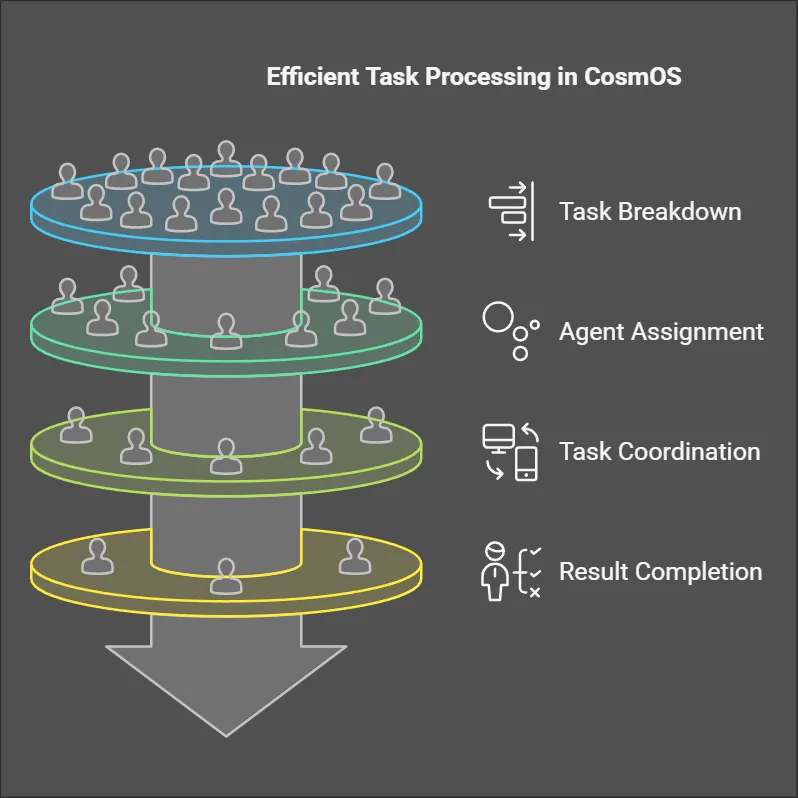
This means:
- When users issue complex requests, CosmOS doesn’t just complete one task at a time; it divides the request into logical steps and assigns them to specialized agents.
- The Ai Bus ensures proper task coordination, making sure information flows smoothly across multiple processes.
- If some agents return incomplete results, CosmOS continues processing until the task is fully resolved.
For example, if a user asks CosmOS to book a vacation, the system will:
- Analyze the user’s travel preferences.
- Check available flights and hotels.
- Compare prices in real-time.
- Suggest the best options.
- Handle booking confirmations and itinerary planning.
All of this happens in seconds because CosmOS handles multiple tasks in parallel rather than sequentially.
Personalization and Context Awareness
A standout feature of CosmOS is its ability to adapt to individual users through continuous learning.
Learning from User Interactions
CosmOS evolves by analyzing user interactions, preferences, and behaviors. This ongoing learning process enables the system to anticipate needs, customize responses, and offer recommendations that align closely with the user’s habits and interests. Over time, this results in a highly personalized experience where the technology intuitively aligns with the user’s lifestyle.
Contextual Relevance
Beyond personalization, CosmOS maintains contextual awareness by integrating real-time data from the web and user-provided information. This ensures that the assistance offered is not only personalized but also contextually appropriate. Whether adjusting to the user’s current location, time of day, or ongoing activities, CosmOS delivers support that is both timely and relevant. For instance, it can suggest nearby dining options during meal times or provide traffic updates before a scheduled appointment.
Multimodal Interaction Capabilities
Recognizing the diverse ways users interact with technology, CosmOS is designed to support multiple input methods.
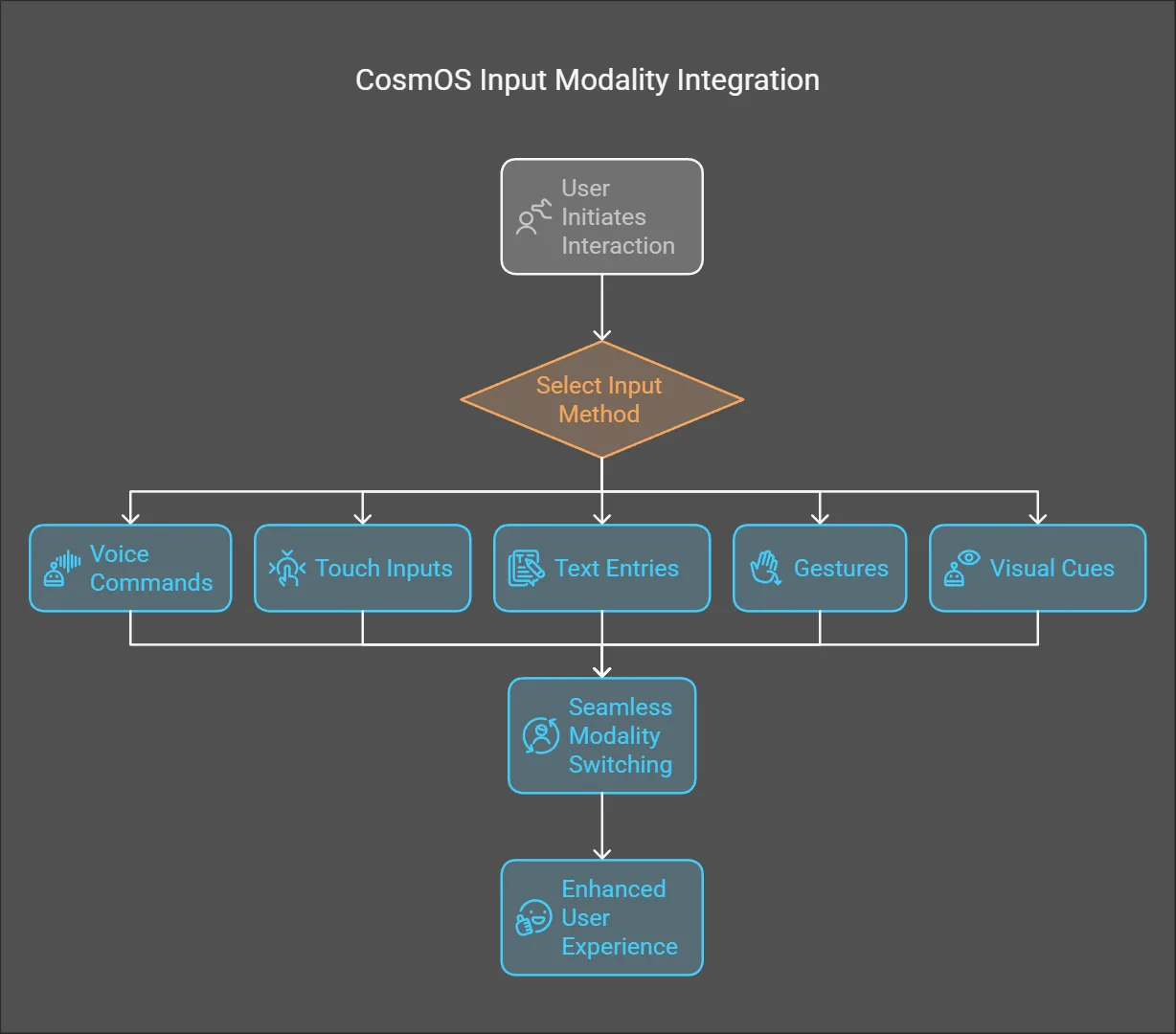
Diverse Input Modalities
Users can engage with CosmOS through voice commands, touch inputs, text entries, gestures, or visual cues. This flexibility ensures that interactions are natural and intuitive, catering to individual preferences and situational demands. For example, in a hands-free scenario, voice commands may be most convenient, while touch or text inputs might be preferred in quiet environments.
Seamless Modality Integration
CosmOS allows for seamless switching between input methods, even within a single interaction. A user might start a task using voice commands and then refine it using touch inputs, with the system maintaining context throughout the process. This fluid integration enhances user experience by providing a cohesive and adaptable interface.
Scalability and Adaptability
CosmOS is engineered with versatility in mind, ensuring it remains relevant across various devices and technological advancements.
Cross-Device Compatibility
The operating system is designed to function across a wide array of devices, from wearable technology to professional workstations. Its adaptable architecture allows it to scale its functionalities according to the capabilities and requirements of each device, providing a consistent user experience regardless of the hardware platform. This means that whether on a compact wearable or a high-performance desktop, users can expect the same level of intelligent assistance.
Integration of Emerging AI Technologies
CosmOS is built to incorporate the latest advancements in AI seamlessly. Its modular design enables the swift integration of new agents and capabilities, ensuring that users have access to cutting-edge features without the need for overhauling the existing system. This forward-compatible approach means that as AI technology evolves, so too does the functionality of CosmOS, keeping users at the forefront of innovation.
Intelligent Error Handling
Unlike traditional OS environments that fail silently when something goes wrong, CosmOS has an advanced error-handling system that ensures uninterrupted service. If an agent encounters a failure or incomplete data, the Ai Bus intelligently redirects the task to alternative data sources or backup agents.
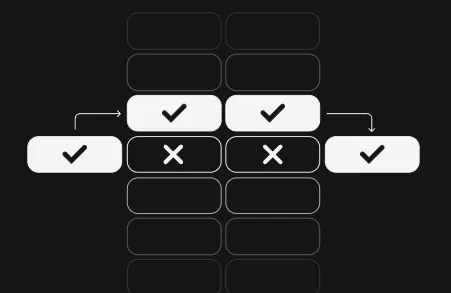
Key benefits of CosmOS’s intelligent error handling:
- If a primary data source is unavailable, CosmOS automatically searches for alternatives.
- If an agent encounters incomplete information, it proactively seeks additional context before finalizing results.
- If an external API used by CosmOS fails, the system either retrieves cached data or switches to a secondary API.
For example, if a user asks for the latest stock market updates, and the primary financial data provider is down, CosmOS will automatically pull data from another reputable source rather than returning an error.
CosmOS vs. Traditional OS Architecture
Traditional operating systems have long followed a layered and rigid architecture, where applications operate independently with minimal interaction between them. This structure, while functional, often results in inefficiencies as users must manually switch between apps, manage data across different programs, and rely on a fragmented system of task execution.
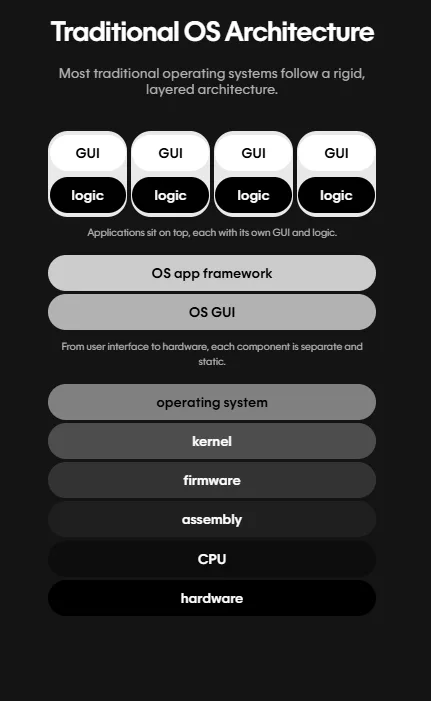
CosmOS revolutionizes this approach by introducing a fluid, AI-driven architecture that eliminates the need for traditional applications. Instead of separate apps running in isolation, CosmOS relies on intelligent AI agents that dynamically collaborate to perform tasks autonomously.
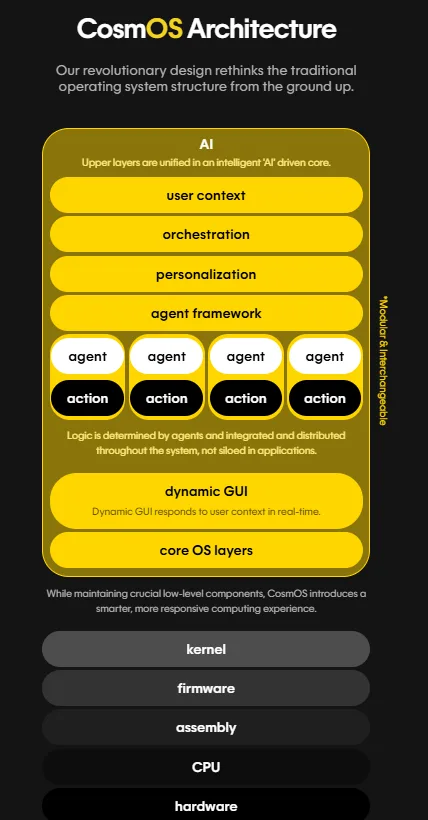
In a traditional OS, applications have their own graphical user interface (GUI) and logic layer, meaning that every program must be manually accessed and operated. A weather app, for example, functions independently from a calendar app, requiring the user to check both separately when planning an event. This lack of integration creates unnecessary steps, leading to a less efficient computing experience.
CosmOS, in contrast, removes the app-based model and replaces it with a task-driven AI framework. Instead of opening multiple programs, users simply make a request—such as “Schedule a trip for next week”—and CosmOS coordinates the necessary AI agents to complete the task. It automatically retrieves weather data, checks flight availability, books accommodations, and updates the user’s calendar without requiring manual intervention.
A key innovation that enables this seamless automation is the Ai Bus, which serves as the central orchestration engine in CosmOS. Unlike traditional OS schedulers that allocate tasks based on predefined app structures, the Ai Bus dynamically distributes work across AI agents, optimizing processing power and ensuring that tasks are executed in parallel.
Another defining difference is the Dynamic GUI. Traditional OS interfaces are static, meaning that users must navigate through various windows and menus to find relevant information. CosmOS, on the other hand, adapts the interface based on context, ensuring that the most relevant information is displayed at the right time. For example, when driving, the interface prioritizes navigation and voice commands, while during a work session, it focuses on productivity tools and notifications.
This AI-first approach enables a more natural and intuitive computing experience, where users no longer need to manage software manually. CosmOS transforms operating systems from passive tools into proactive AI-driven assistants, redefining how humans interact with technology.
Privacy and Security Measures
In an era where data privacy is paramount, CosmOS places a strong emphasis on safeguarding user information.
Data Encryption and Ownership
All personal data within CosmOS is encrypted using unique keys controlled by the user. This ensures that sensitive information remains secure both during transmission and while stored on cloud servers. Users retain full ownership of their data, with the ability to manage access permissions and decide how their information is utilized. This empowerment fosters trust and confidence in the system’s handling of personal information.
Transparent Sensor Usage
Devices running CosmOS are equipped with dedicated privacy chips that provide visual indicators—such as a Trust Light—whenever sensors like cameras or microphones are active. This transparency ensures users are always aware of when their device is capturing data, allowing them to make informed decisions about their privacy.
Ethical AI Implementation in CosmOS
With AI playing a central role in CosmOS, ethical considerations are paramount. Humane has implemented stringent policies to ensure responsible AI usage, balancing technological advancements with ethical guidelines.
Bias Mitigation and Fairness
CosmOS is designed to minimize bias in its AI models. By employing diverse training datasets and continuously auditing AI agents, the system aims to prevent discriminatory behavior in decision-making. Humane integrates fairness-focused algorithms that detect and correct biased outputs before they are presented to users. This commitment to ethical AI ensures that CosmOS remains an inclusive and equitable platform for all users.
Explainable AI (XAI) and User Control
Unlike conventional AI systems that function as “black boxes,” CosmOS embraces transparency through Explainable AI (XAI) principles. Users can access explanations for why an AI agent made a particular recommendation or decision. This enhances trust in the system by allowing users to understand the rationale behind AI-driven actions. Additionally, users can override AI suggestions, ensuring that human judgment remains a critical factor in interactions with CosmOS.
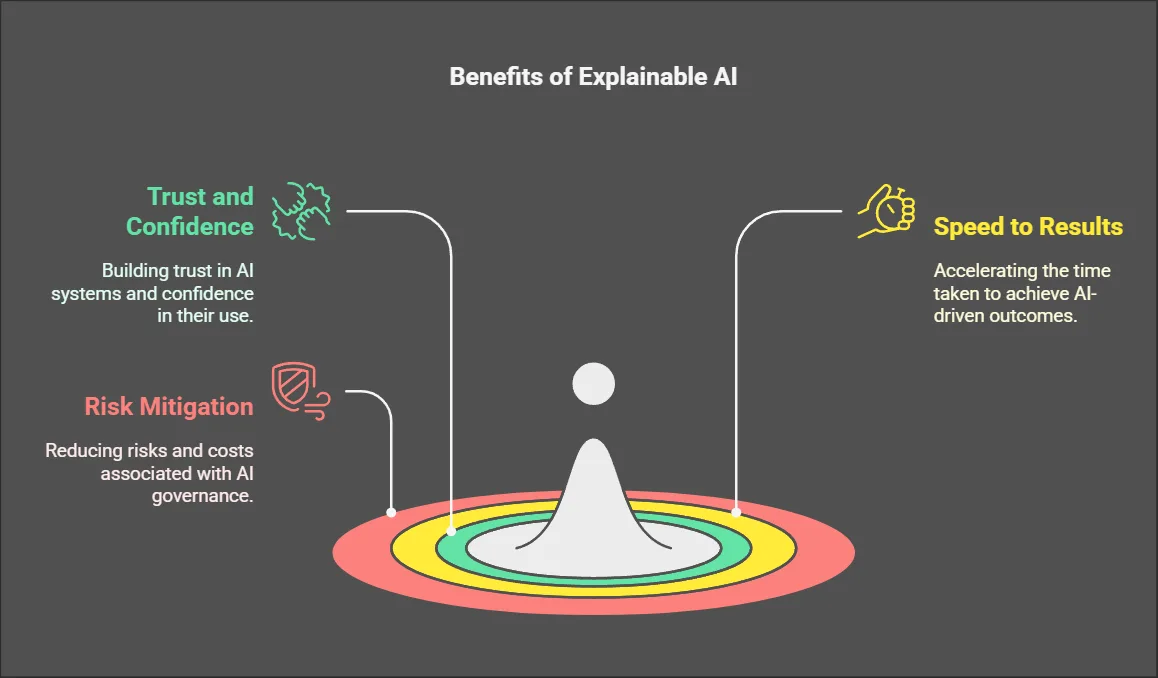
Continuous Monitoring and Responsible AI Governance
To uphold ethical standards, CosmOS undergoes continuous monitoring by an AI ethics board. This board evaluates the impact of AI decisions and refines algorithms to align with ethical best practices. Humane has also established an AI governance framework that prioritizes accountability, ensuring that AI agents operate in users’ best interests at all times.
The Role of CosmOS in Future Technologies
CosmOS is not just an operating system; it is a foundational platform for the future of AI-driven computing. Its capabilities extend beyond conventional applications, paving the way for new innovations across industries.
AI in Smart Devices
With its seamless cross-device integration, CosmOS is poised to revolutionize how AI operates in everyday gadgets. Whether embedded in wearables, home automation systems, or augmented reality devices, CosmOS enables intelligent interactions that enhance user experience. For instance, in smart home environments, the operating system can anticipate user needs by adjusting lighting, temperature, and security settings based on behavioral patterns.
Autonomous Systems and Robotics
The AI-driven nature of CosmOS makes it an ideal candidate for integration into autonomous systems, including self-driving vehicles and robotics. Its ability to process real-time data and adapt to dynamic environments allows autonomous machines to make informed decisions with high precision. In industrial automation, CosmOS can coordinate robotic workflows, optimizing efficiency and minimizing downtime.
Healthcare and Assistive AI
In the medical field, CosmOS has the potential to revolutionize healthcare through intelligent diagnostics and patient monitoring. AI agents within the system can analyze medical records, detect early signs of diseases, and provide recommendations for treatment plans. For individuals with disabilities, CosmOS can act as an assistive AI, offering real-time speech-to-text conversions, navigation assistance, and personalized support.
Challenges and Future Enhancements
While CosmOS represents a significant breakthrough in AI-powered operating systems, there are still challenges that need to be addressed for widespread adoption.
Computational Efficiency and Hardware Requirements
Given the complex AI models and real-time processing capabilities of CosmOS, computational efficiency remains a crucial factor. Humane is continuously optimizing CosmOS to run efficiently on a broad range of hardware, from low-power wearable devices to high-performance workstations. Future enhancements may include dedicated AI accelerators that improve processing speeds while minimizing energy consumption.
Expanding Developer Ecosystem
To maximize the potential of CosmOS, a robust developer ecosystem is essential. Humane is actively working on expanding support for third-party developers, allowing them to create and integrate custom AI agents within the system. The introduction of the CosmOS SDK (Software Development Kit) will empower developers to build new functionalities, further enriching the capabilities of the operating system.
Interoperability with Existing Systems
For CosmOS to achieve mainstream adoption, seamless interoperability with existing software ecosystems is crucial. Humane is developing compatibility layers that enable CosmOS to integrate with traditional operating systems, cloud platforms, and enterprise solutions. This ensures that businesses and individual users can transition smoothly to CosmOS without disrupting their current workflows.
The Competitive Edge of CosmOS
As the demand for AI-driven operating systems grows, CosmOS sets itself apart from competitors through its unique approach to intelligent computing.
Moving Beyond Traditional OS Models
Unlike traditional operating systems that rely on rigid application structures, CosmOS adopts a dynamic, agent-based architecture. This departure from conventional computing models allows for greater flexibility and adaptability, making CosmOS a future-proof solution.
Focus on User-Centric AI
CosmOS prioritizes user experience by integrating context-aware intelligence that understands and adapts to individual needs. This user-centric approach contrasts with other AI systems that offer generalized solutions without personalization. By continuously learning and evolving, CosmOS ensures that interactions become more intuitive and efficient over time.
Commitment to Privacy and Ethical AI
With growing concerns over data security and AI ethics, CosmOS’s emphasis on privacy-first computing gives it a significant competitive advantage. The system’s decentralized data ownership model and transparent AI governance set a new benchmark for responsible AI deployment.
Conclusion
CosmOS is more than just an operating system—it is a glimpse into the future of human-computer interaction. By leveraging AI to create an intelligent, context-aware, and privacy-focused computing environment, CosmOS redefines the role of operating systems in the digital age.
With its ability to seamlessly integrate across devices, anticipate user needs, and operate with ethical transparency, CosmOS stands at the forefront of the AI revolution. As Humane continues to refine and expand the capabilities of CosmOS, the possibilities for intelligent computing are limitless. Whether in personal devices, enterprise applications, or cutting-edge technological advancements, CosmOS represents the next frontier in AI-powered operating systems.
